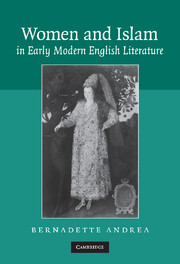Book contents
- Frontmatter
- Contents
- Acknowledgments
- Introduction
- Chapter 1 Early modern queens and Anglo-Ottoman trade
- Chapter 2 The imaginary geographies of Mary Wroth's Urania
- Chapter 3 Early Quaker women, the missionary position, and Mediterraneanism
- Chapter 4 The female wits and the genealogy of feminist orientalism
- Chapter 5 The scandal of polygamy in Delarivier Manley's roman à clef
- Coda: Arab women revisit Mary Wortley Montagu's hammam
- Notes
- Index
Chapter 4 - The female wits and the genealogy of feminist orientalism
Published online by Cambridge University Press: 22 September 2009
- Frontmatter
- Contents
- Acknowledgments
- Introduction
- Chapter 1 Early modern queens and Anglo-Ottoman trade
- Chapter 2 The imaginary geographies of Mary Wroth's Urania
- Chapter 3 Early Quaker women, the missionary position, and Mediterraneanism
- Chapter 4 The female wits and the genealogy of feminist orientalism
- Chapter 5 The scandal of polygamy in Delarivier Manley's roman à clef
- Coda: Arab women revisit Mary Wortley Montagu's hammam
- Notes
- Index
Summary
In a frequently cited essay, Joyce Zonana characterizes “feminist orientalism” as the displacement of “the source of patriarchal oppression onto an ‘Oriental,’ ‘Mahometan’ society, enabling British readers to contemplate local problems without questioning their own self-definition as Westerners and Christians.” This articulation of feminism and orientalism is epitomized by Mary Wollstonecraft's A Vindication of the Rights of Woman (1792), which pronounces,
Thus Milton describes our first frail mother; though when he tells us that women are formed for softness and sweet attractive grace, I cannot comprehend his meaning, unless, in the true Mahometan strain, he meant to deprive us of souls, and insinuate that we were beings only designed by sweet attractive grace, and docile blind obedience, to gratify the senses of man when he can no longer soar on the wing of contemplation (emphasis added).
Wollstonecraft's Vindication, that is, confirms the tendency within anglocentric feminism towards the displacement of patriarchal oppression from the normative “freeborn” English woman onto an orientalized other. Such distancing premises the self-definition of the English nation as exclusively western and Christian, with its normative woman incorporated into the cultural and racial exclusions constituting the generic, though implicitly masculinist, subject position. As “the founding text of Western liberal feminism,” Wollstonecraft's Vindication thus presents “the fullest explicit feminist orientalist perspective.” Yet, to assume that feminist orientalism begins with Wollstonecraft, or that the alliance between feminism and orientalism is inherent to the English tradition, ignores the previous century of feminist debates.
- Type
- Chapter
- Information
- Women and Islam in Early Modern English Literature , pp. 78 - 104Publisher: Cambridge University PressPrint publication year: 2008

